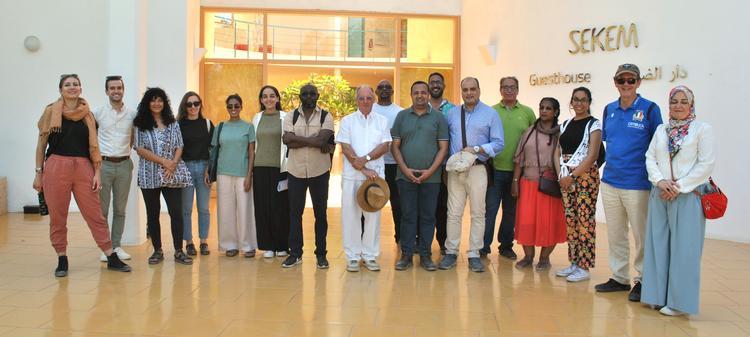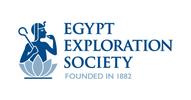Creative Climate Leadership Retreat

The Creative Climate Leadership Retreat was held from 22 to 30 September 2024 at the Gulbenkian Prize-winning eco-lodge, SEKEM, in Cairo Egypt. This unique learning experience, the first of its kind held in Egypt, was facilitated by Julie’s Bicycle, a pioneering not-for-profit, mobilising the arts and culture to take action on the climate, nature and justice crisis. They have worked in Egypt and the wider region previously, notably in partnership with the British Council.
Their team curated the Retreat based on the principles of their successful Creative Climate Leadership programme which offers training and transformation to empower artists and cultural professionals to take action on the climate and ecological crisis with impact, creativity, and resilience. They assembled a team of three trainers covering culture-based climate challenges as well as those specifically affecting the heritage field:

Chiara Badiali joined JB in 2012. She is a researcher and facilitator working across Julie’s Bicycle’s programmes and events, on topics from practical environmental impact reduction to cultural policy. She has co-designed the Creative Climate Leadership programme and learned with groups of change-makers around the world. She studied natural sciences, and previously worked in cultural PR and for music and arts festivals in programming and production.

Taghrid Choucair-Vizoso joined Julie’s Bicycle as Head of Programmes in March 2024. She is a cultural leader with thirteen years of curatorial, producing, and educational experience working across contemporary performance, multi-art form festivals, participatory arts, and cross-cultural programmes. Prior to joining JB she was Joint CEO at Shubbak Festival, where she was committed to forging more just cultural ecologies; developing collaborative and decolonial curatorial approaches and artistic development opportunities that reduce social inequality and access barriers to the arts.

Salma Sabour leads the Preserving Legacies project as Director of Science, integrating climate science with community-based and locally led heritage conservation. She specialises in innovative climate methodologies and training in data downscaling and communication of climate data, integration of plural knowledge systems, and fostering collaboration among communities, heritage professionals, and climate scientists through co-creative workshops. With dual diplomas in physical and environmental engineering and an interdisciplinary PhD from the University of Southampton, she has researched coastal heritage resilience to climate change. Salma has contributed to journals like Environmental Research Letters and consulted with organisations such as UNESCO, IPCC, ICOMOS, and the World Bank. She is committed to equity and inclusion and advocates for climate awareness, enjoying nature and playing the tenor saxophone.
The Retreat was organised in partnership between the Egypt Exploration Society, British Institute in Eastern Africa, and Council for British Research in the Levant with thanks to the Ministry of Tourism and Antiquities in Egypt.
Supported by
Aims
The Creative Climate Leadership Retreat aimed to increase awareness of climate change and its impact on cultural heritage (tangible and intangible). Taking a holistic approach, the Retreat also considered the wider impact on communities associated with that heritage, whether as legal or moral rightsholders, or a broader stakeholder group. It also aimed to embed discussions of adaptation into the organisations represented with the hope that this will lead to further policy change – both within the organisation and in those nations where they are located. The final session of the Retreat discussed pragmatic action plans and next steps so that toolkits for practitioners can be developed and made accessible.
Participants
Attendees of the Retreat represented three of the collaborating BIRIs (the EES, BIEA, and CBRL) as well as organisational partners such as archaeological/heritage projects and community groups.
| Bassem Ibrahim Ibrahim Mohamed | Director of the Department for Site Management, Ministry of Tourism and Antiquities, Egypt |
| Carl Graves | The Egypt Exploration Society |
| Essam Nagy | The Egypt Exploration Society |
| Anna Stevens | The Amarna Project |
| Ziad Morsy | Honor Frost Foundation |
| Mirette Magdy | Bibliotheca Alexandria |
| Eric M Kioko | British Institute in East Africa |
| Kennedy Gitu | British Institute in East Africa |
| Ikhlas Abdul Latif | National Corporation for Antiquities and Museums, Sudan |
| Bob Bewley | Council for British Research in the Levant |
| Haifaa Abedalhaleem | Petra National Trust / ICOMMOS-Jordan |
| Aya Hany | Megawra / Athar Lina |
| Leena Mekawi | Egyptian Heritage Rescue Foundation |

The participants received a tour of SEKEM from Rafik Georg Costandi (middle)
Key themes
The Retreat was split into various themes that set the wider context before moving onto practical implementation of adaptive methodologies. The content was provided by Julie’s Bicycle working together with Salma Sabour (Preserving Legacies) and included:
- Big picture: The climate context
- Cultural heritage and climate action: A timeline
- Stakeholder mapping
- Climate’s impact on heritage places
- Future climate scenarios
- Future-visioning: Working with local communities
Excursions were also made including a a tour of Heliopolis by Dietrich Raue, Director of the Deutsches Archäologisches Institut in Cairo, a walking tour of historic Cairo and a guided walk by Aya Hany of the work of Megawra in El Khalifa, and the Giza plateau.
Next steps
Each of the collaborating BIRIs expect to embed the learning from the Creative Climate Leadership Retreat in their own organisations and projects. The EES will continue to update its webpage with useful resources and information where researchers can find out more information about climate change and its impact on heritage and ways of mitigating or adapting to those challenges.





